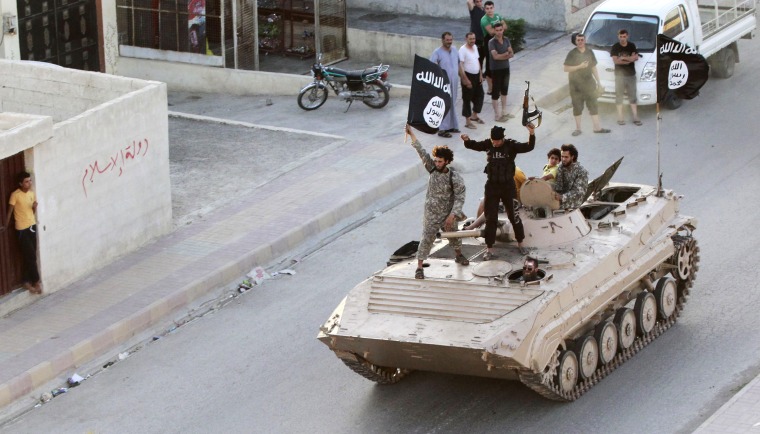The day after the midterm elections, President Obama made a surprise announcement during a press conference: he'd welcome congressional authorization for the use of force against Islamic State targets in the Middle East. "The world needs to know we are united behind this effort and the men and women of our military deserve our clear and unified support," he said.
The comments were overdue, but welcome -- the U.S. military offensive began in August, and given the scale of the mission, it seemed pretty obvious that Congress had a responsibility to debate and endorse the campaign. Indeed, by some estimates, the U.S. military has now launched more than 1,100 airstrikes in Iraq and Syria, all as part of a mission lawmakers have not authorized.
Maybe Congress will meet its obligations before wrapping up for the year? Apparently not. Consider the bizarre scene in the Foreign Relations Committee yesterday.
It takes a lot to surprise Sen. John McCain, R-Ariz., who has served in the chamber for nearly 30 years, but Thursday's Foreign Relations Committee water bill debate did just that. The committee considered a surprise effort by Sen. Rand Paul, R-Ky., to try to attach a Declaration of War against the terror group known as Islamic State, ISIS or ISIL to an unrelated water bill the committee was considering. "It was the most bizarre meeting of the Foreign Relations Committee that I have ever attended in my life, or ever expected to attend," McCain said.
Members were supposed to tackle a pending proposal to expand international access to clean water, but Paul instead offered a surprise: a Declaration of War, to be considered as an amendment to the water bill.
Several committee Democrats who support authorizing force against ISIS were willing to take up Paul's proposal, but they collectively backed off and agreed instead to have a separate hearing on Monday.
But even that will be largely for show -- even if the Foreign Relations Committee were to debate, write, and approve a resolution authorizing force, there almost certainly won't be enough time for the Senate to consider such a measure, and the odds of a House vote are even more remote.
"There's not a snowball's chance in Gila Bend, Ariz., I promise you," McCain told Roll Call of an AUMF clearing the Senate before the end of the lame-duck session.
And that's a problem.
Remember, U.S. military strikes began in August. Some members suggested Congress should return to work and debate the mission, but that never happened. Lawmakers worked briefly in September, chose not to take up the national security fight, then gave themselves October off.
Then November went by. Now the remaining workdays in December are dwindling. For all the supposed Republican apoplexy about President Obama pushing the limits of executive powers past the breaking point, the administration is overseeing an aggressive military campaign, which has received no authorization, and which Congress isn't inclined to even talk about.
Sen. Tim Kaine (D-Va.), who's been more vocal than most in criticizing these circumstances, told the Washington Post "there's a strange conspiracy of silence."
And that silence will now extend into the new year.
Postscript: It's worth noting that Paul's Declaration of War is problematic, even for those who may be inclined to agree with his broader point. His resolution doesn't simply extend congressional approval to Obama's campaign against ISIS, it also treats Islamic State as itself an actual state.
Sam Kleiner explained, "The Islamic State (IS) has desperately tried to portray itself as a legitimate state -- by doing everything from collecting taxes to issuing passports to printing currency -- and Paul's move only bolsters their case. A Declaration of War would confer a great deal of legitimacy on IS not as a terrorist group or barbaric band of thugs, but an enemy state. Paul's measure runs counter to the position taken by the international community, which has sought to delegitimize IS."
